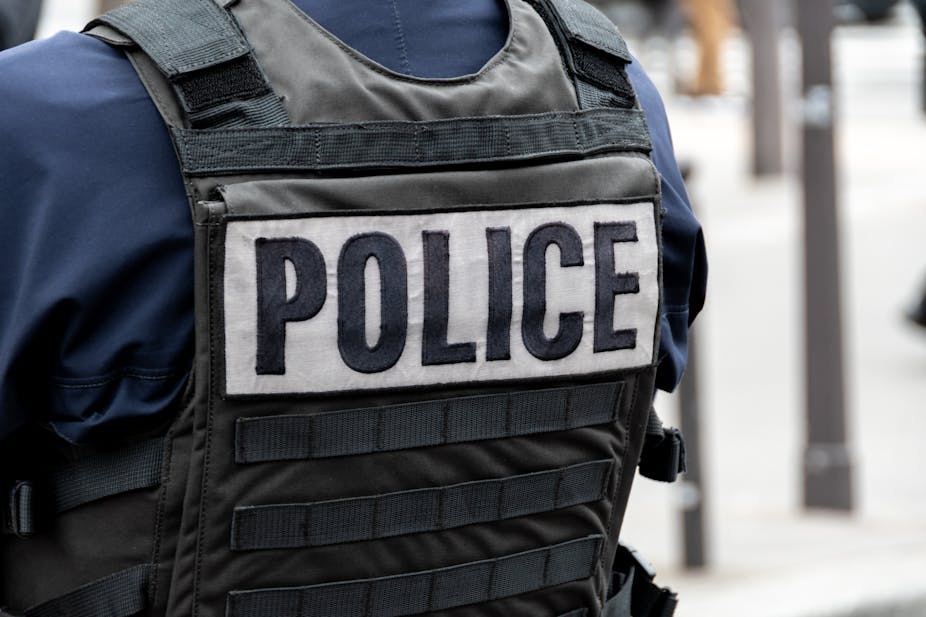The relationship between Ghanaian citizens and officers of its police service is a tenuous one. Recent reports by the research network Afrobarometer show a decline in trust between citizens and officers amid complaints of harassment and bribery. There have also been accusations of the police being used by the political hierarchy to stifle dissent by force during protests. The Conversation’s Godfred Akoto Boafo speaks to criminologist Justice Tankebe about the reasons behind the breakdown in trust and ways to improve it.
Do Ghana’s police serve the interests of citizens?
We can think of these interests in terms of people’s expectations of policing. My research has identified four dimensions of these interests.
First is the effective use of police authority to protect citizens from violence and threats to their constitutional rights. Fear of crime is a reasonable indication of police effectiveness. Data from Afrobarometer shows that, in 2002, 16.8% of Ghanaians feared becoming victims of crime at their homes. This declined to 9.2% in 2012 but has now risen to 24.6%.
The second dimension is lawful police conduct. Police officers do not serve this interest when they engage in illegal practices such as robbery, unlawful killing of civilians or bribery. A recent survey funded by the United Nations Office on Drugs and Crime showed that 53.2% of Ghanaians who interacted with police officers paid them a bribe.
Thirdly, policing serves the interests of Ghanaians when it treats people equally. Simply put, people’s social class, ethnicity, religious beliefs, or political affiliation should not influence the decisions of police officers.
Finally, policing must listen to citizens, explain decisions to them, treat them with respect and care for their wellbeing. Fair treatment communicates symbolic messages about a person’s social standing and inclusion; hence it matters greatly to citizens. A survey of Ghanaians shows a little over half of them think the police treat them fairly.
Why are the police struggling to serve Ghanaians?
The first reason is the colonial roots of the Ghanaian police, which continue to show in three ways:
police officers expect people to accept decisions without question
officers are subservient to elites, who have undue influence on police work
the police are not sufficiently accountable to local communities.
Some officers try to curry favour with politicians in the hope of future advantages such as promotions. This is exemplified in the leaked audio of an alleged plot to replace Ghana’s police chief, which is now the subject of a parliamentary investigation.
Beyond the colonial legacy, political interference means there’s a risk of unsuitable people being recruited to the police. They may lack the appropriate motivation and ethical inclination. The adequacy of training and the quality of supervision are also doubtful. The absence of credible accountability structures also limits scrutiny of how officers behave.
Finally, the behaviours that supervisors model to frontline officers can affect how they interact with citizens. For example, a survey found that officers who felt their superiors treated them with disrespect and partiality were less committed to fair treatment of the public.
What are the consequences for democracy?
Police scholar David Bayley has argued that the quality of policing is an important measure of democratic governance. A country cannot claim to be democratic if the police arbitrarily arrest people, humiliate them, suppress political dissent, and exceed their legal mandate.
When citizens lose faith in democracy, they become tolerant of military interventions. So efforts at democratic consolidation must pay attention to the state of the police. Indeed, some scholars argue that this may help save democracy from the threat of the military taking control.
This matters greatly in a sub-region of increasing political instability and terrorism threat.
What reforms are required?
First, there is a need for ideological re-orientation. The Ghana police say their mandate is to “prevent and detect crime, to apprehend offenders and to maintain public order and safety of persons and properties”. This is indistinguishable from their colonial mandate. Unsurprisingly, police tactics are militaristic and prioritise order over the democratic rights of citizens.
A democratically oriented police service would view its mandate as creating conditions for citizens to enjoy their constitutional rights. It would ask: “how can we facilitate protests and protect protesters?” rather than “what reasons can we find to prevent a protest?”.
The second area for reform is police accountability. Ghanaians have limited information about the internal accountability mechanisms, such as what happens to complaints filed against police officers. Research evidence shows the lack of appropriate signals from the Ghana Police Service deters officers from reporting unethical colleagues.
As I have previously argued, the Ghana Police Service needs independent democratic oversight.
Thirdly, reforms are required to insulate the police from political capture. Ghana’s constitution grants the president the right to appoint the police chief. The president also effectively controls the promotion of senior officers through the police council. The same processes as those used in recruitment into civil service should be considered. Yet this is unlikely to make a difference unless police officers are fully committed to their democratic mandate. They must maintain ethical relationships with politicians and other elites who seek to capture the state for their personal interests.
Finally, there is a need to develop a culture of evidence-based policing. This requires a closer relationship between the police and academics who have the methodological tools to support the police in evaluating the effects of their interventions.

